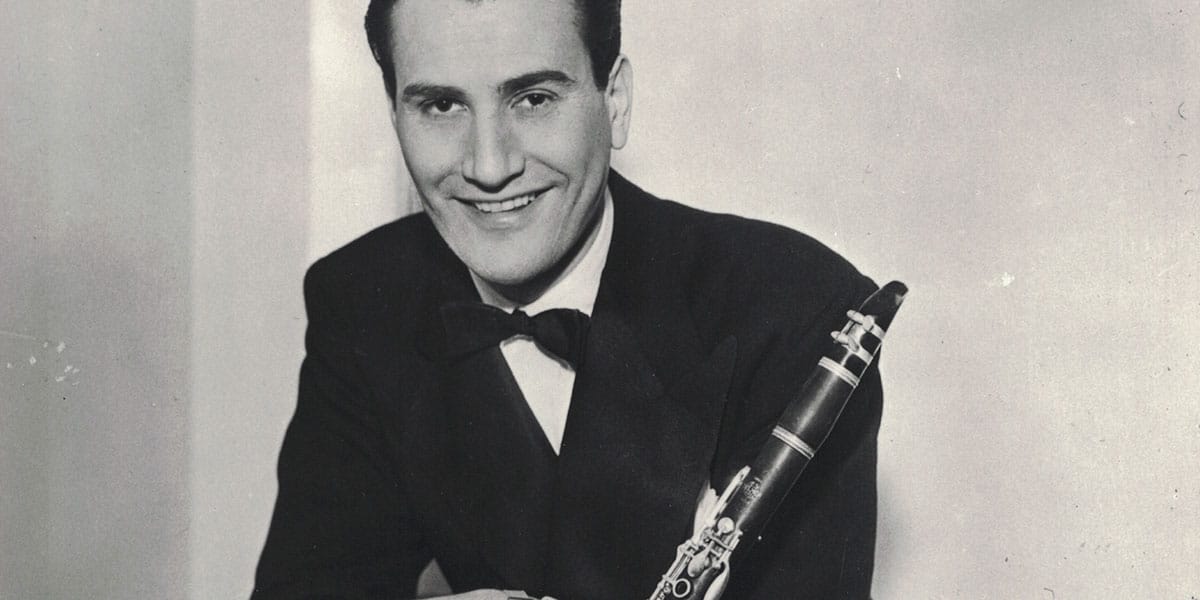




Dir/Wri: Brigitte Berman | Canada | 1985 | 115m | English
An Oscar-winning music documentary about the mercurial clarinetist Artie Shaw returns to the screen after many years in a pristine new restoration.
Shaw (1920-2004) was no ordinary musician: his restless intellectual curiosity and uncompromising nature took him from postwar poverty to stardom in Hollywood where he would tirelessly reinvent himself as a pioneering saxophonist and bandleader, flouting the colour barrier of the time by hiring African Americans like Billie Holiday, Hot Lips Page and Roy Eldridge to play alongside him. Shunning celebrity in the 1940s Shaw would go on to write four bestsellers. His charisma and matinee idol good looks saw him marrying eight times, his wives included Lana Turner, Ava Garner and Evelyn Keyes. He even dated Rita Hayworth.
In Brigitte Berman’s Artie Shaw: Time is All You’ve Got (1985) we join Artie in the privacy of his own home as he talks us through his five-decade career, enlivened by interviews and a treasure trove of photos and archival film footage. Berman refuses to try anything tricksy or complicated with her storyline, adopting a straightforward chronological structure – and this is one of the plus points of this engrossing Oscar-winning documentary.
She sets the scene with a brief prologue. Artie Shaw (1910-2004) was born Arthur Arshawsky on the Lower East Side, to immigrant parents. An only child, he was teased for being Jewish when his family later moved to Connecticut. Retreating into books and music he taught himself the clarinet, practising eight hours a day, to escape his loneliness: “I just wanted to get up there on the stage in the bright lights with those pretty girls…and get out of where I was living”.
After ‘expelling himself’ from school to focus on music he soon found work as a jobbing clarinetist and saxophonist and headed to New York which was the capital of jazz in 1929. There the best work was to be found on the radio stations and Shaw was well paid. By the end the of the 1930s he would be earning USD 60k a week. From time to time during his career he became disenchanted by the music scene, taking time out to reflect on his second love, writing. In one of these ‘sabatacle’ breaks he bought a farm in Bucks County and hoping to spend the rest of his life there coming to the conclusion eventually that his recalcitrant personality and inability to compromise was better suited to writing than show business which required constant collaboration.
All that said, Shaw would go on to become one of the most popular stars of the 1930s and 40s Swing era – and a friendly rival to “King of Swing” Benny Goodman with his own compositions like “Nightmare”. His big break came in 1938 with a recording of Cole Porter’s “Begin the Beguine”. After that he never looked back as a leading light on the big-band circuit.
But it wasn’t always plain sailing – heading for the West Coast in 1939 to support soldiers during the war effort he fell ill with leukaemia, but was soon back on his feet after a ground-breaking treatment. Here his fame often got in the way of his solidarity with the others in his desire to entertain troops, and be assisted in his efforts to do so. When asked on one occasion: “Who do think you are?” He answered: I know who I am: but who do YOU think I am?”
Tiring of fame during the ‘jitterbug’ era when he literally walked offstage after being hit by a dancer’s heel during a stint as the house bandleader at New York’s Pennsylvania Hotel. The public was offended when Shaw angrily branded the jitterbugger as ‘morons’, for not taking music more seriously. Undeterred, he refused to come back, but of course he would return.
Although he never professed to be an actor, Shaw appeared alongside Fred Astaire and Paulette Goddard in H C Potter’s 1940 outing Second Chorus that sees Artie taking on two competitive college students (Burgess Meredith and Fred Astaire) after hiring their band manager Ellen Miller (Godard). The pair then compete to win Ellen’s heart.
Berman is an award-winning Canadian film director best known for her 1981 documentary debut BIX: Ain’t none of them play like him yet, which focused on another jazz legend Bix Beiderbecke. Berman shows how Shaw’s restlessness and intellectual curiosity drove him forward to explore his creativity and collaborate with a number of well known stars of the time including vocalist Mel Tormé, drummer Buddy Rich – who give interviews – and actress/ex-wife Evelyn Keyes (Gone With The Wind), whose other ex-husbands included director John Huston. @MeredithTaylor
A tribute to my father Gordon Taylor who was inspired to learn the clarinet by Artie Shaw | Screening at Film Forum from Friday, January 5 to Thursday, January 11 – the New York premiere of a new 4K restoration, supervised by the director.